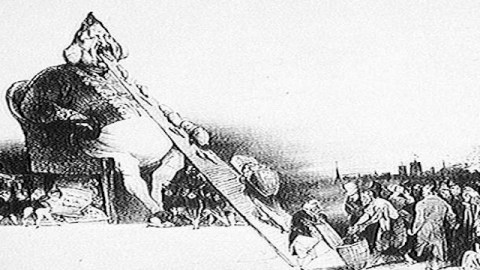Is Capitalism To Blame for Worldwide Obesity?

Why do people get fat, increasing their personal risk of heart disease, diabetes and other “lifestyle” diseases and society’s risk of fiscal collapse from the expense of treating millions of people with those ailments? Conventional wisdom, favored by governments and a vast and growing “wellness industry” around the world, is that it’s because individuals can’t control themselves. Accordingly trillions of dollars, euros, yen, rupees and other monies will be spent in the next few decades to nudge people into jogging and giving up potato chips and dessert, for their sake and their nation’s. It would be a damn shame if that turned out to be a colossal waste of money. But it may be, if we learn years hence that obesity wasn’t caused by individual choices at all. A number of researchers have been making this argument, pushing against received opinion, and of them, the most striking is probably this new paper: The key cause of the global obesity epidemic, it says, is capitalism.
It’s a striking paper (perhaps the only one you’ll ever read that references both receptor pathways for the hormone leptin and data on the size of the Indian economy before and after the British took over). There is, for example, where it was recently published: Not in some obscure pool of Marxist theorizing, but in the peer-reviewed American Journal of Human Biology. The author, Jonathan C.K. Wells, is an expert on fat metabolism in humans who works at the Childhood Nutrition Research Centre at the Institute of Child Health of University College London. On the evidence of this paper, he is as far from an ideological ranter as a human being can be. He seems instead to be a scientist who has been driven to exasperation by conventional wisdom, which looks to explain obesity only within the narrow viewpoint of individuals and the calories they consume.
Let me paraphrase Wells’ intricate argument as a multigenerational saga. It begins with you, a poor farmer growing food crops in a poor country. Capitalism appears with your colonial masters when Europeans take control of your economy. The new system encourages you and your neighbors to stop growing your own food and instead produce, say, coffee for export. Now that you aren’t growing food, you need to buy it. But since everyone in a capitalist economy is out to maximize profit, companies strive to pay you as little as possible for your crop, and to pay your factory-worker children as little as possible for their labor. So capitalism has, first, removed various traditional protections against starvation by changing your farming system, and, second, made sure you aren’t paid enough to eat well.
Cut to 80 years later. Thanks to globalization and outsourcing, your descendants have risen out of the ranks of the poor and joined the fast-growing ranks of the world’s 21st century middle-class consumers. Capitalism welcomes them. They are now targets for efforts to get them to buy things they don’t need, which of course includes foods and beverages that you could never have afforded. They’ve been put at risk of obesity because capitalism encourages them to over-eat.
But that’s not the worst of it. As Wells describes in detail, there is a lot of recent research to suggest that a body’s physiological response to food is heavily influenced by experiences in the womb and in early life. Moreover, it’s also influenced by the environment that a person’s mother lived in—not just when that mother was pregnant, but also when she was a child, and even a fetus in the womb of her mother. So the effects of under-nutrition last a lifetime, and are even passed across generations. And those effects appear to promote obesity.
It seems under-nutrition in a person’s early life, or even similar food deprivation in the life of that person’s parents, can set the metabolism to create fat reserves quickly and keep them. In other words, if you or your parents or their parents were under-nourished, you’re at a higher risk of becoming obese in a rich-food environment. (As Wells explains, when food is insufficient, evolution favors bodies that make and keep fat reserves, and once this adaptation is set it can’t be turned off when food becomes more plentiful.) Moreover, obese people, when they have children, pass on changes in metabolism that can predispose the next generation to obesity as well. Like the children of under-fed people, the children of the over-fed have their metabolism set in ways that tend to promote obesity.
So a past of undernutrition, combined with a present of overnutrition, is an obesity trap (Wells memorably calls the “metabolic ghetto”) that can’t be escaped by turning poor people into middle-class consumers. In fact, that turn to prosperity is what sets off the trap. In India, China and many other rapidly expanding economies, capitalism itself caused under-nutrition in previous generations and now causes over-nutrition today.
In other countries (Wells cites Ethiopia, where he has done research), the two forces are at work at the same time, making some poor workers unable to eat well even as their richer compatriots switch to a diet of processed foods.) Since capitalism is the driver of both past and current under-nutrition and today’s over-nutrition, Wells has concluded that capitalism itself is a long-lasting world-wide “obesogenic” force. “Obesity,” Wells writes, “like under-nutrition, is thus fundamentally a state of malnutrition, in each case promoted by powerful profit-led manipulations of the global supply and quality of food.”
He buttresses this claim with some detailed theorizing about the biochemistry, physiology and epigenetics that link poor nutrition in early life and later obesity. As the environmental epidemiologist Paolo Vineis pointed out in his review for the F1000 website, Wells’ theory suggests plenty of questions that could be answered by both lab and field experiments. This is not an ideological screed; it’s a peer-reviewed proposal for a theory that connects work on the economics of food with work on the way that environment affect bodies and behaviors.
But aren’t we all free to choose not to participate in this fattening system? As Wells sees it, the “unifying logic of capitalism” is exactly the opposite of this cliché about free markets. We may think we’re free to choose what to eat and how to eat it, but, he writes, food companies maximize their profits by restricting our choices, “both at the behavioral level, through advertising, price manipulations and restriction of choice, and at the physiological level through the enhancement of addictive properties of foods” (by which he means those sugars and fats that make processed foods so habit forming as well as fattening).
What is to be done, then?
Rather than harping on personal responsibility so much, Wells argues, we should be looking at the global economic system, seeking to reform it so that it promotes access to nutritious food for everyone. Also, we need to develop policies to fight hunger that don’t send people into the “obesogenic niche,” and, finally, regulate commercial interests so that they pay poor people better and market less fattening shlock to the better off.
I admit, I read that list and thought, Good luck with that. You can get rich people to fund efforts to get others to jog and watch their diet and be disciplined about check-ups (which amounts to trying to get the population to act more like rich people, so it’s an easy sell). But who is going to fund work that questions the very basis of their power to fund things?
Still, maybe I’m too pessimistic. It’s increasingly clear that the current consensus—people are obese because they individually decide to eat too much—is unsatisfactory. (To cite just one reason, that explanation doesn’t account for why in the 21st century animals are also becoming obese along with our species.) A number of alternative theories are circulating, which locate the cause of our “obesity epidemic” in society’s collective activities rather than in individual decisions about exercise and cookies.
One candidate, as Kristin Wartman recently explained, is all the chemicals we modern people ingest, specifically organic pollutants like BPA. Another, as Beatrice Golomb explains here (search the page for her name to find the post), are industrial metals. Others have cited the stresses of modern life, including loneliness and lack of sleep. Wells’s idea is, to my mind, the most mind-blowing of all these alternative ideas about obesity. Whether or not he’s right, this paper will scrub your mind of unexamined assumptions and leave you thinking more clearly about a major global problem.
Wells, J. (2012). Obesity as malnutrition: The role of capitalism in the obesity global epidemic American Journal of Human Biology DOI: 10.1002/ajhb.22253




